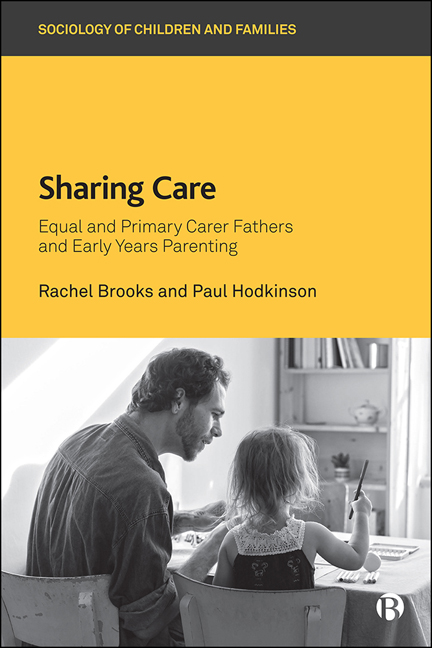Book contents
- Frontmatter
- Dedication
- Contents
- Acknowledgements
- 1 Sharing Care: An Introduction
- 2 Extended Fatherly Involvement: Development and Understandings
- 3 Developing Policy Support for Care-sharing: And its Limitations
- 4 Shifting Care Horizons: Care-sharing Arrangements, Motivations and Transitions
- 5 Developing Fatherly Roles and Identities: Towards Parental Equivalence?
- 6 Daytime Social Isolation from Other Parents
- 7 Care-sharing Futures
- Appendix: Table of Participants
- References
- Index
1 - Sharing Care: An Introduction
Published online by Cambridge University Press: 11 March 2021
- Frontmatter
- Dedication
- Contents
- Acknowledgements
- 1 Sharing Care: An Introduction
- 2 Extended Fatherly Involvement: Development and Understandings
- 3 Developing Policy Support for Care-sharing: And its Limitations
- 4 Shifting Care Horizons: Care-sharing Arrangements, Motivations and Transitions
- 5 Developing Fatherly Roles and Identities: Towards Parental Equivalence?
- 6 Daytime Social Isolation from Other Parents
- 7 Care-sharing Futures
- Appendix: Table of Participants
- References
- Index
Summary
Beyond ‘being there’
His relationship always had been ‘50/50’, Scott says, and his unusual level of involvement in the care of his one-year-old child – which contrasts with the more traditional arrangements taken up by most of his friends – feels like an extension of that, though it was also enabled by other factors, including parity of earnings between him and his partner. Following a year of parental leave that was split between them, they both now work flexibly in order to enable each to have weekday time alone with their one-year-old and limit their use of day care. They also share childcare tasks as evenly as they can in the evenings and on weekends and, although he works longer hours than her overall, he is also the one more likely to take time off if their son is sick because his work offers greater holiday entitlements. He is proud and happy about the arrangement, and his boss – a mother herself – has been supportive, even if colleagues occasionally quip about his ‘days off’ or ‘babysitting’.
Sharing care has not been all plain sailing. Scott's partner struggled emotionally on her initial return to work after seven months and found it difficult to hand over a significant portion of daytime care duties, which also led to feelings of guilt for Scott himself. Meanwhile, although she had established valuable relationships with other mothers, he has often felt isolated when caring on weekdays, with ventures out into daytime public spaces punctuated by insecurities about how he might be judged by others and envy of the apparent camaraderie of groups of mums he encounters. This early difference between him and his partner has affected the overall scope of his parenting, with her solely responsible for liaising with other parents about playdates or birthdays, for example. She also deals with appointments with health and parent-support professionals, having established routines of doing so during her maternity leave. Nevertheless, Scott looks forward to his days at home with his son, feels the arrangement has been good for him and his family, and reflects on the confidence he has gradually developed as a caregiving father and his strengthening emotional bond with his son.
- Type
- Chapter
- Information
- Sharing CareEqual and Primary Carer Fathers and Early Years Parenting, pp. 1 - 16Publisher: Bristol University PressPrint publication year: 2020



